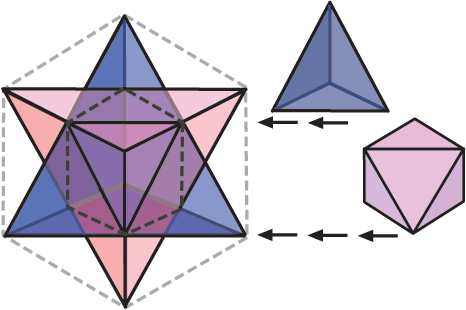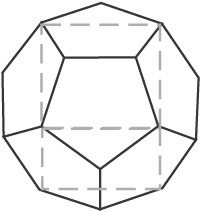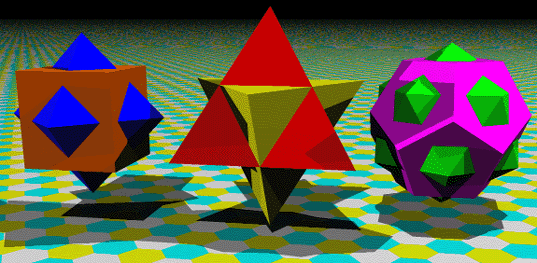14.1 FUSION OF “OLD”, “NEW” AND “EXTRATERRESTRIAL”
The aetheric vibrational model that we have just proposed in the last chapter certainly is compelling, in light of the geometry-based energetic behavior that we have seen on all planets throughout the Solar System, but we still have a major hurdle to cross over in terms of unifying this viewpoint with modern science.
In this chapter we will reveal some of the surprising connections between the “new” science that we have been discussing up until this point, and the writings in the ancient Vedic scriptures of India. We will also compare this with more of Seth’s writings and some information on current ideas of the nature of dimensions in the universe.
Together, we should be able to find some common ground between these different areas.
14.2 MODERN DIMENSIONAL CONCEPTS
The modern scientific topic of higher dimensions is a very interesting and yet very difficult study to approach, and it often leads to confusion even on behalf of those who have advanced degrees in mathematics and science.
The vast amounts of specialized information, mathematical models and hyper-complex lingo has effectively prevented the different camps from being able to understand each other and assimilate their different findings.
There seems to be an innate belief that the idea of planes higher than our own must be extremely difficult, almost impossible for us to understand in the scientific sense. This is quite a difference from the idea that all “dimensions” are simply differing levels of energetic density and vibration, which are all organized into an “Octave” structure.
As alleged extraterrestrial entity Seth says in the Jane Roberts book Seth Speaks,
Your entire concept of space is so distorted that any true explanation is highly difficult.
When considering the “Octave” as a viable solution, we should remember that almost all physicists agree that when you finally solve a major scientific puzzle for good, the solution is shockingly beautiful, simple and understandable. That’s when you know that you’ve got a working model, and not a complex mess that is shored up only by outrageous-looking equations handed down on tablets of stone from the lofty peaks of the scientific priesthood, for a select few to try to understand.
We now know that geometry as a model for higher “dimensions” of space and time is already a working model; we can see it at work on the planets. The best explanation for this geometry that we have observed is that it is formed by a vibration of aether.
For the non-scientific public, most people don’t know what “higher dimensions” are, where they are, how they function, what they mean, whether they are inhabitable, et cetera. Should the common people try to learn more about this subject by reading articles in Scientific American magazine and the like, they will only become more confused, as each article may well argue a completely different case.
At the time of this writing there are many different scientific speculations as to the number of dimensions that exist — you can literally choose whether you will have three, four, five, six, eight, nine, ten, eleven or twenty-six! All these theories agree that the three main dimensions — length, width and height — exist, as that is simple geometry.
So bearing that in mind, let’s round up the different cases:
FOUR: Einstein proposed that the fourth dimension was time, though no one can truly prove or measure this. He realized that time needed to be able to be measured with geometry in order to build up his visualized model of the Universe. But instead of simply seeing time as a movement of energy, he neatly tucked it into a “dimension” like the three in space and left it at that.
FIVE: Kaluza-Klein theory showed that if a fifth dimension was added to Einstein’s proposed mix, many more mathematical problems could be effortlessly solved – including a long sought-after unification of gravity and electromagnetism, at least in the theoretical sense. Einstein did accept this concept after studying it thoroughly, though not all of his supporters recognize it.
SIX: Instead of time being confined to just one ‘dimension’ in Einstein’s theory, Dewey Larson and John Nordberg both propose that there are only three “real” dimensions that we know in space, but there is a time dimension to correspond with each dimension of space. The idea of a density of time to match each density of space was endorsed by ET sources such as the Ra Material; they simply proposed a greater number of space-time levels.
EIGHT: This shows up in gauge theory, a version of “Superstring” theory, and it perfectly corresponds with the idea that there is an Octave of dimensions. Furthermore, almost all credible sources of higher intelligence agree that this is the true number of dimensions in the universe. The theories of Tony Smith also give us an eight-dimensional universe with geometric qualities, built up with eight-leveled numbers known as “Octonions.”
TEN OR 26: Based on the “modular functions” of Srinivasa Ramanujan, discussed below, superstring theory makes a strong case that there are either ten or twenty-six dimensions and also postulates an energy substance existing through space – which certainly seems to be the case. In their theory the energy substance appears as a web of intertwining “strings” of energy. Light is said to be a vibration of a superstring in the fifth dimension.
NINE OR ELEVEN: More recent mathematical theories insist that there must be either nine or eleven dimensions, and through 1999 to 2001 these have grown more in their public exposure.
As we can see, the scientific community presents us with many different contradictory opinions. We can literally choose almost any number for the dimensions that we want, and be able to back it up with “scientific evidence.”
To make matters worse, due to the colossal difficulty in understanding these higher dimensions, (based on our presently flawed models of universal energy,) most mainstream mathematicians conclude that all dimensions above our third must be compressed down into a single point that is the size of “Planck’s quantum,” or 10^-32 centimeters!
Such an incredibly tiny point would make the atom seem to be the size of a planet in comparison, and it is believed to be the smallest possible “unit” of space-time that could ever exist. Certainly this would be quite a crowded place to try to visit in the dream plane or an out-of-body experience!
14.2.1 ORTHOGONAL RELATIONSHIPS
To many frontier scientific thinkers, the idea of extra dimensions in space, beyond the obvious axes of length, width and height, seems to be fundamentally impossible. If you look at the axis of width and compare it to the axis of height and length, you can see that no matter where you look, each of the three axes will form 90-degree “right angles” with the other two.
Increasing the confusion, scientists have come up with another word for this right angle relationship between two lines or axes, referring to it as an orthogonal relationship.
Therefore, when physicists are looking at the possible existence of higher dimensions than our three, they expect to see one or a series of additional orthogonal rotations, or 90-degree “right-angle” turns, that are somehow “away” from the length, width and height of the space that we now have and into a hitherto-undiscovered and unobservable area of space!
If this sounds impossible to you, then you are exactly where you need to be at this point in the book. What a paradox! As far as we have ever been able to detect, no matter where you move, up, down, left, right, forward or backward, you’re still going to be right here in our own natural “three-space!”
Most scientists are still fixed on the idea of dimensions, not densities of energy, since they are usually unwilling to admit that the aetheric “vacuum” energy even exists. In reality, when anyone tries to think of “dimensions” as being anything but a way to measure length, width and height in the universe that we now know, we immediately encounter some very big problems.
No one has ever seen a “one-dimensional” or “two-dimensional” world… there is no ‘universe’ on a straight line or a flat plane that we have ever observed. The idea of measuring space by using three dimensions is one thing, but suggesting that there are other dimensions to measure seems ridiculous.
So, if it sounds ridiculous then why do we have such an idea? The problem arises from the fact that the mathematics clearly shows that there must be “something” there that we are not now aware of; there must be more “room” for energy to move around in than what we now see in our physical reality.
Since space was thought to be “empty” and to not have any core energy within it, the only choice left was to change space; to mathematically add more levels of measurement to empty space, instead of seeing that the qualities of the energy in space itself could change.
So how did all the confusion get started in the first place? The idea that space could be measured with more than three “dimensions” came about from the observations of the behavior of the basic forces of energy in the universe, which are electrostatics, magnetics, gravity, weak nuclear and strong nuclear.
Remember that all scientists have been chasing after a “Unified Field” theory where we can prove that all of these basic forces are part of one unified energy source. And if we do not consider the existence of a vibrating zero-point energy, then the mathematics that we use to measure these different forces simply do not “fit together” until we start adding extra “dimensions” into the puzzle for them to move around in.
Only with this extra “room” for the forces to interact do they start to be able to integrate together into a possible Unified Field. The idea of a fifth dimension was considered an ingenuous breakthrough that led Kaluza and Klein to make the all-important unification of gravitation and electromagnetics.
Then, the question seemed to be, “Where are these dimensions, and what is their relationship to each other?”
Since the main formation of energy that we know and understand is the electromagnetic wave, which Einstein believed would eventually show us this Unified Field, it was believed that this wave contained the secret key to unlock the door to “higher dimensions.” Our scientists saw that in the electromagnetic wave, the electrostatic wave and the magnetic wave travel orthogonally, or at 90-degree angles to each other.
It was believed that this peculiar 90-degree relationship was essentially showing us two axes, or two dimensions, such as length and width or width and height, interacting with each other, with the movement of the wave providing the third axis. Therefore, they felt that it was safe to assume that higher dimensions, and the energy that would travel through them, would also keep preserving this 90-degree orthogonal relationship.
This means that if we “turn away” from the electromagnetic wave and move 90 degrees into another measurement axis of space that we cannot currently see in our own “dimension,” then in very loose terms, we will “find” the area where all the energy can “fit together.”
Again, this is by no means an easy concept to grasp. The confusion lifts when we see these “dimensions” as simply being different densities of aether energy. You can have all different densities in the three dimensions of space that we now know, and energy will behave (vibrate) differently in each of these densities.
It just happens to be a coincidence that Ra says that we are now in the “third density of vibration” and that modern scientists always say that we are in the “third dimension.” Ra makes it clear that first and second-density lifeforms are all visible to us now and exist around us as “three dimensional” forms.
First density “lifeforms” are basic elements of nature such as earth, air, fire and water: rocks, minerals, oil and gases, all the different chemicals which we normally do not consider to be alive.
Second-density lifeforms being everything from single-celled organisms to plants to birds, monkeys and dolphins. Every creature that we would normally define as “living” is second-density in the Ra model, except human beings. These lower-density creatures certainly do not live on a flat plane or a line!
14.2.2 A BETTER “FIT”
Despite the apparent distortions in the view of mainstream science, the mathematical calculations that are involved have already proven beyond any doubt that geometry plays a crucial part in all of this. These Platonic geometries are required to exist to provide the “room” for these unseen additional axes in “hidden” 90-degree rotations to appear.
To their way of analyzing the data, each face of the geometric shape could represent a different axis or plane that could be rotated into. If this seems difficult to understand, we could compare it to the idea of a soccer ball, which can have many different hexagons on its surface. As the soccer ball rolls along, different hexagons will actually contact the ground and align with its plane.
However, the entire concept of Platonic geometries being connected to higher planes only came about because they knew that the geometry had to be there; they found it in their equations. When we start considering the work of Dr. Fuller and Dr. Jenny, we can see that this idea of other planes that exist at “hidden” 90-degree rotations was most likely an incorrect explanation, based on the lack of knowledge of the “sacred” connections between geometry and vibration.
14.2.3 QUALITY, NOT QUANTITY
As we can see, the idea of “orthogonal rotations” is quite confusing and uncomfortable, and we do not intend for this chapter to be a burden to read. We remind ourselves that many different camps have their own ideas as to the true number of dimensions, and each camp strongly feels that their answer is right.
The mathematics involved in these various speculations are staggering, and they cannot all be correct since each is contradicting the other’s opinions. What we will address in this book is not the rigorous, quantitative, mathematical values of these different levels, but rather a qualitative view, meaning that we are interested in making a simple, straightforward analogy for what is going on without mathematics.
14.3 VEDIC COSMOLOGY
In The Shift of the Ages, we presented the Vedic system as having “all the answers” that we were looking for to solve the dimensional puzzle, and later in this chapter we will share this research again. However, when we wrote Shift, all we presented was just one clue that would suggest that the ancient Aryans were somehow on the right track; we showed the actual geometric Octave itself, which organized all the Platonic Solids into a unified progression that has an Octave structure.
In this book we are trying to be more well-rounded and have our arguments more firmly supported. In an attempt to strengthen the foundations behind such a key point in our model as the geometric Octave, we decided to explore the Vedic cosmology in more detail.
Obviously, if the Vedic scholars were right about the various planes of existence as being geometric in nature, then they must have understood a great deal about the aetheric paradigm as we have now rediscovered it to be. The question now becomes whether the evidence exists to suggest a correspondence between Vedic teachings and our own research.
In The Shift of the Ages, we have described how some of the Vedic scriptures clearly describe advanced flying machines known as “Vimanas” as well as a very clear, unambiguous description of a nuclear missile, called “a bolt of iron… charged with the light of a thousand suns” whose effects were described in a way that sounds literally identical to what we have witnessed with the flashpoint and subsequent radiation fallout of atomic weapons.
In Dr. Richard Thompson’s book Alien Identities, there are a number of connections made between various celestial beings as seen in the Vedic texts and modern extraterrestrial reports, establishing a clear link between the two.
In Dr. Thompson’s most recent work, he has shown how the ancient Vedic scriptures give a remarkably accurate description of all the planets in the Solar System, complete with measurements of their orbits that are very precise.
The reason why this wasn’t discovered before, says Dr. Thompson, is that no one had done their homework well enough to discern what the correct Vedic measurement units actually were. Once he found that missing link, everything precisely fit together with what we now know.
The Vedas date themselves as being 18,000 years old, and this is automatically rejected as being impossible. However, as we have presented in The Shift of the Ages, there is mounting evidence for the existence of an ancient advanced civilization that perished in a worldwide cataclysm some 12,500 years ago.
In the case of the Vedas, some of this original knowledge was able to be preserved through all of this time, and our main task now is simply to understand it. Bearing that in mind, there is more than enough reason to suggest that the ancient Hindu culture was very well educated about the same science of universal energy that we are now re-discovering in this book.
The compelling evidence for this idea can be seen very clearly in Rama Prasad’s book from 1894, entitled Nature’s Finer Forces: The Science of Breath and the Philosophy of the Tattvas. We shall begin this chapter with an excerpt from Prasad’s Preface:
The book is sure to throw a good deal of light upon the scientific researches of the ancient Aryans of India, and it will leave no doubt in a candid mind that the religion of ancient India had a scientific basis.
Several different Sanskrit terms will need to be introduced here in order for us to understand what Prasad has written.
14.4 PRAKRITI
First, the overall name for matter in its original form is Prakriti, the feminine principle, and in Robert Lawlor’s book Sacred Geometry we see that this is intended to illustrate the geometry of the dodecahedron. Any time that the word “Prakriti” is used, its definition is “undifferentiated cosmic matter.”
This undifferentiated matter is then acted upon by the forces of vibration to bring the universe into being, as we shall see. The opposing male principle is Purusha, which the Vedic scholars associated with the icosahedron. The sexual concept of Purusha and Prakriti mating is not difficult to see when we notice that by putting an equal-sized icosahedron and dodecahedron together, the points of the icosahedron will be seen to merge through the center of each face of the dodecahedron.
For our purposes in this chapter, we simply need to remember that Prakriti is the word for the original undifferentiated matter of the universe.
14.5 THE GREAT BREATH / PARABRAHMAN
Another important term is “The Great Breath.” In the Vedic system, all of the Creation comes into being from the energetic “breathing” movement of the One Creator as a Being, which is referred to in Sanskrit terms as “Parabrahman” or “Brahman” for short.
This Oneness then splits into duality as Prakriti and Purusha. We have already seen how this breathing motion can be demonstrated in the time-varying rising and falling of planetary atmospheres, such as on Venus in the 24-hour “breath” of the ionosphere and the four-day “breath” movement of the atmosphere. So already, we can start to see the connections that exist between the Vedic model and modern principles.
14.6 THE TATTVAS
The basic Sanskrit word for vibration is Tattva, which is defined as “(i) a mode of motion. (ii) The central impulse which keeps matter in a certain vibratory state. (iii) a distinct form of vibration.”
One important distinction that needs to be made is that the ancient Vedic system had five main levels of “tattvic” aether vibrations. These were in turn expanded into seven levels by allowing two of them to have separate positive and negative attributes.
As Ra noted in the Law of One series, this type of variability between different spiritual systems can be rather confusing when we are trying to construct an Octave-based cosmology that links together all the densities of aetheric vibration as One.
The main Octave of “true color” vibrational levels of “aether density” have had different names and different groupings depending on the system that classified them. However, on behalf of the Vedic system it is also true that there are only five Platonic Solids, and in the Hindu geometric octave given in Sacred Geometry, we have the icosahedron used twice as well as the sphere being used to signify the Oneness, at points one and eight, the beginning and end of the Octave.
On page 118 we see the following very important point, which proves our statement that you can see these tattvic levels as either being five or seven in nature, thus showing the connection between systems:
The universe, as has been seen, has five planes of existence (which may also be divided into seven.)
The sevenfold breakdown of dimensional levels, in this case as applied to the vibrational or chakra levels in the human being, are given on page 146 as follows:
1. The gross body (Sthula Sharira).
2. The unhappy Prana.
3. The unhappy Mind.
4. The happy Prana.
5. The happy Mind.
6. The soul (Vijnana)
7. The spirit (Ananda)
This is remarkably similar, if not identical in the philosophical sense, to Ra’s illustration of the seven levels of aetheric density as they correspond to the development of consciousness in the human being, summarized here. The connections are most easily seen between levels 1 and 4-7:
1. (Awareness) Earth / Malkuth center, gross physical / elemental body.
2. (Growth) Growth and development without knowledge of self, “animal” consciousness.
3. (Choice) Self knowing mind attained, plane of suffering, choice to serve others or self.
4. (Love) The level of love. Wisdom is not sought or developed here.
5. (Light) Light, Mind and Wisdom fully developed here but not unified with love.
6. (Unity) The balance between compassion (love) and wisdom is practiced here.
7. (Gateway) The Sacramental Nature of All Things is realized and the gateway to return to the Oneness is opened.
14.7 PRANA
Perhaps the closest word to “aether” in the Vedic system is the term “Prana.” This may be confusing to us, as two of the modes of vibration given in the list above are both “minor pranas,” in this case as the “unhappy Prana” and the “unhappy Mind.” This apparent contradiction is explained in the following definition for Prana, which speaks of minor Pranas as existing as well:
[Prana is] the life principle of the universe and its localized manifestation; the life principle of man and other living beings. It consists of an ocean of the five Tattvas. The suns are the different centers of the ocean of Prana. Our solar system is filled to its extremest limit with Prana, and it is in this ocean that move the various heavenly bodies.
It is held that the whole ocean of Prana, with the sun and moon and other planets, is a complete picture of every living organism on earth, or, for that matter, of any planet. Hence is Prana spoken of sometimes as a person, a living being. All the manifestations of life in the body are known as minor Pranas.
The pulmonary [heart] manifestation is known as Prana by preeminence. The positive phase of matter is also [referred to as Prana] as distinguished from Rayi, the negative phase of life matter.
It is very interesting that the definition of Prana indicates that it is fluidlike, by associating it directly with an ocean. This is a direct correspondence with what we have seen in the science of the aether thus far, both with experiments like Dr. Aspden’s as well as planetary phenomena.
The five main Tattvas or vibrational levels are in the Vedic system are associated with many different five-fold concepts in humanity, including the five senses, the five fingers and toes and the five appendages on the human body, being the two legs, two arms and head. Most of Prasad’s work is focused on explaining them only as five principles, and we would need to turn to other sources to get more extensive descriptions of how these principles work in a system of seven:
The Tattvas are the five modifications of the Great Breath. Acting upon Prakriti this Great Breath throws it into five states, having distinctive vibratory motions, and performing different functions.
Here, we will give a summarized list of each of the five main Tattvas and which of the five bodily senses they are associated with, followed by an excerpt from the book right after they are introduced:
1. Akasha Tattva: Sound.
2. Vayu Tattva: Touch.
3. Tejas Tattva: Sight.
4. Apas Tattva: Taste.
5. Prithivi Tattva: Smell.
They are variously known as Mahabhutas. The word Akasha is generally translated into English by the word ether. Unfortunately, however, to modern English science sound is not known to be the distinguishing quality of ether…
Prasad obviously did not foresee a time when the entire concept of aether as a whole would be shunned by modern science!
14.8 “SVARA” OF VEDAS AND SETH CONCEPTS
The next term that is important here is the word “Svara.” This word is used to explain the presence of the spiraling lines between geometries that Ra refers to as “the spiraling line of light.” It is also conveys the same meaning as the term “The Great Breath.”
The Tattvas… are the modifications of Svara… The proper translation of the word Svara is the current of the life-wave.
It is that wavy motion which is the cause of the evolution of cosmic undifferentiated matter into the differentiated universe, and the involution of this into the primary state of non-differentiation, and so on, in and out, for ever and ever.
Whence does this motion come? This motion is the spirit itself…
It should interest us that the Tattvas, which we now know of as being three-dimensional geometric energy vibrations, are described as being modifications of Svara, or the spiraling current. Could we indeed create all the Platonic Solids as modifications of spiraling lines?
Yes. They are all able to be modeled from spirals, as we suggested with the image of the six triangles formed by the “phi” spiral in the last chapter and the chart that showed the simple spiraling relationships between each of the basic geometries.
As this book progresses, we will see clear, undeniable evidence for the existence of this spiraling wave, which we have already begun to suggest with the idea of the phi and square root of two waves that connect the Platonic Solids to each other in an expanding, spiraling progression. As the Vedic scholars said, this is a constant interplay of evolution and involution that is going on.
What does “constant” actually mean? Are we to think of it as being something that only takes place over huge periods of time? Or, does “constant” mean “all the time,” possibly at a speed that is far too fast for us to measure?
Seth describes a more specific form of “constant” pulsation occurring in the universe in Chapter 7 of Seth Speaks, session 530; a pulsation that forms all of matter moment by moment. Seth says that this pulsation is occurring faster than we could ever know, so that we are forever “blinking in and out” of our current “density” as the aetheric energy that forms our reality pulsates through its other modes of vibration.
Normally we have no idea that any of this is happening:
…To begin with, your physical form is the result of great emotional focus. The fantastic energy of your psyche not only created your physical body, but maintains it. It is not one continuous thing, although to you it seems permanent enough while it lasts. It is nevertheless in a constant state of pulsation, and because of the nature of energy and its construction, the body is actually blinking off and on.
Now: This is difficult to explain, and for our present purposes it is not entirely necessary that you understand the reasons for this pulsing; but even physically, you are “not here” as often as you are. Your emotional intensity and focus create forms beside your physical body, however their duration and degree dependent upon the intensity of any given emotional origin.
Your space is therefore filled with incipient forms, quite vivid, but beneath the regular structure of matter that you perceive…
As we go along, we will see that this last statement of Seth about “incipient forms” is literally identical to the Vedic cosmology; in the Vedic system these forms are called “Trutis” and in Seth’s work they are called “electromagnetic energy units” or, as Seth also called them, “consciousness units.” We now continue at the same point in our Seth excerpt:
These projections [of electromagnetic energy forms,] then actually are sent out constantly. Some more sophisticated scientific instruments than you now have would clearly show not only the existence of these forms, but also vibrations in varying waves of intensity surrounding those physical objects that you do perceive.
(9:57.) To make this clearer, look at any table in the room before you. It is physical, solid, and you perceive it easily. Now for an analogy, imagine if you can that behind the table is another just like it, but not quite as physical, and behind that one another, and another behind that — each one more difficult to perceive, fading into invisibility.
And in front of the table is a table just like it, only a bit less physical appearing than the “real” table — it also having a succession of even less physical tables extending outward. And the same for each side of the table.
Now anything that appears in physical terms also exists in other terms that you do not perceive. You only perceive realities when they achieve a certain “pitch,” when they seem to coalesce into matter. But they actually exist, and quite validly at other levels…
In the above paragraphs we can see that Seth is giving us a very valuable point to consider:
The vibrations of aether that form physical matter are actually being duplicated in the other densities, with a rippling-style effect.
Such a rippling effect of “spheres within spheres” has been seen in the spherical tornado cascades, the Roschin and Godin experiment and Dr. Chernobrov’s experiments as well. You can have a physical object with other levels of aetheric density that are not visible to the human eye, but it nevertheless still exists in those levels as well.
This is why we can still see all stars and planets with our eyes, even if a source such as Ra says that there is life on these planets in higher densities. Anything that we would call “physical matter” is also creating vibrations in these other planes of existence; and Seth carefully chooses the word “pitch” to describe the vibrations of these different planes.
Although our physical matter may be somewhat visible in these higher densities, there could just as well be vast amounts of energy formations in the higher densities that we cannot see, because they do not have the correspondingly lower vibrational frequencies to become “physical.”
In certain cases there is a blending effect between these different realms, such that paranormal phenomena resembling ghosts and UFOs are seen to suddenly appear and disappear or change shape, as is often reported. Seth makes this point by saying that there are systems created by energy that is more “concentrated” than what we have here:
Yours is not a system of reality formed by the most intense concentration of energy, therefore. It is simply the one you are tuned into, part and parcel of. You perceive it simply for this reason.
Other portions of yourself, therefore, of which you are not consciously aware, do inhabit what you would call a supersystem of reality in which consciousness learns to handle and perceive much stronger concentrations of energy, and to construct “forms” of a different nature indeed.
Your idea of space is then highly distorted, since space to you is simply where nothing is perceived. It is obviously filled with all kinds of phenomena (pause,) that make no impression at all upon your perceptive mechanisms.
Now in various ways and on occasion, you can tune into these other realities to some degree – and you do so spasmodically, though in many cases the experience is lost because it does not register physically.
14.9 THE GREAT BREATH OF PARABRAHMAN
All of these points that Seth makes are perfectly echoed in the science of the Vedas, as Prasad has been illustrating for us in the excerpts we have cited so far.
In our next excerpt, we see a description about how the energy of Parabrahman goes through phases of expansion and contraction, which are referred to as “days” and “nights” and also associated with heating and cooling.
We then get a description of how the vibrational levels themselves come about. This may seem to be a little too complicated, but we will soon see that the key point is that in the Vedic model, the aether forms itself into spheres, just as our own modern research has led us to conclude, along with the writings of Seth, Ra and others:
After being subjected to the negative [contraction] phase of Parabrahman, [or the Oneness,] Prakriti [or undifferentiated matter,] which follows Parabrahman like a shadow, has been saturated with evolutionary receptivity; as the hotter current sets in, changes are imprinted upon it, and it appears in changed forms.
The first imprint which the evolutionary positive current leaves upon Prakriti is known as Akasha, [the first level of aether vibration.] Then, by and by, come into existence the remaining ethers. These modifications of Prakriti are the ethers of the first stage.
Into these five ethers, as now constituting the objective plane, works the current of the Great Breath. A further development takes place. Different centers come into existence. The Akasha throws them into a form which gives room for locomotion [movement.]
With the beginning of the Vayu [or second] Tattva these elementary ethers are thrown into the form of spheres. This was the beginning of formation, or what may also be called solidification.
These spheres are our Brahmandas [universes of vibration.] In them the ethers assume a secondary development. The so-called division into five takes place… Every tattvic [vibrational] quality is generated into, and preserved in, these spheres by these currents. With the Apas [Tattva] the formation [of the sphere] is complete. In process of time we have a center and an atmosphere. This sphere is the self-conscious universe… [emphasis added]
So, what we see here is a very clear description of the formation of the universe as the primordial “consciousness unit” at the beginning of the Creation, which we should now begin to understand as being a very likely accurate picture of what did occur.
14.10 MANU AND SEVEN “LOKA” SPHERES OF EXISTENCE
As this excerpt goes on further, we see how this creation continues on into solar systems such as our own. These systems are said to be created on the energetic level long before they are created on the physical level.
The next new term that we are given here is Manu, a word for the universal mind. We are also presented with the idea that the Sun’s existence comes from the interplay of “positive” and “negative” matter. To some this may seem unrealistic, but let’s not forget that the CU shows signs of a north-south or positive-negative flow, and in the planets there seem to be counter-rotating spherical energy fields at work as well:
These centers come, in fact, into existence even before the earth is manifested on the gross plane. So also do the centers of other planets come into existence. As the sun presents himself to the Manu [Universal Mind,] there come into existence two states of the matter in which the sun lives and moves — the positive and the negative.
As the solar Prana, after having been for some time subjected to the negative shady state, is subjected in its revolutionary course to the source of its positive phase, the figure of Manu is imprinted upon it. This Manu is, in fact, the universal mind, and all the planets with their inhabitants are the phases of his existence…
The suns revolve around these centers with the whole of their atmospheres of Prana. This system gives birth to the Lokas or spheres of life, of which the planets are one class.
These Lokas have been enumerated by Vyasa in his commentary on the Yogashastra (Pada iii. Sutra 26).
The aphorism runs thus:
“By meditation upon the sun is obtained a knowledge of the physical creation.”
On this says the revered commentator:
“There are seven Lokas (spheres of existence)…”
It is not my purpose to try at present to explain the meaning of these Lokas. It is sufficient for my present purpose to say that the planets, the stars, the lunar mansions are all impressions of Manu, just as the organisms of the earth are impressions of the sun [having their original component materials formed from it]…
Every little atom of Prana is comparatively cooler than the next one towards the sun from itself. Hence equal and opposite vibrations cancel each other…
14.11 TRUTIS
Even more interesting is the next excerpt, which discusses what are called “Trutis.” We can now see that these “Trutis” are indeed “vacuum domains” or consciousness units as we have seen them in the work of Dr. Dmitriev and others.
The excerpt also suggests that these consciousness units are connected directly with the structure of atoms, which we will be exploring in future chapters. Furthermore, we also get a description of the fractal or holographic principle of “the whole is seen in all of its parts,” and we must remember that this book was published in 1894, long before fractals or holograms ever came into being:
It might be noted down here that the whole of this Prana is made up of innumerable little points. Of these points I shall in future speak as Trutis, and might say here that it is these Trutis which appear on the terrestrial plane as atoms (Anu or Paramanu).
They might be spoken of as solar atoms. These solar atoms are of various classes according to the prevalence of one or more of the constituent Tattvas, [which are the five main levels of vibration.]
Every point of Prana is a perfect picture of the whole ocean. Every other point is represented in every point. Every atom has, therefore, for its constituents, all the… Tattvas, in varying proportions according to its position in respect of others. The different classes of these solar atoms appear on the terrestrial plane as the various elements of chemistry…
This concept of “Trutis” matches perfectly with Seth’s conceptions of “electromagnetic energy units.” Here, we will bring forth an organized list of the different properties of these units as expressed by Seth in the earlier book The Seth Material. In our previous book we did not edit the data in this way, but with what we are trying to do in this book, it is much more suitable to break the information down into categories:
Now: there are electromagnetic structures… that are presently beyond your (scientific) instruments, units that are the basic carriers of perception. They have a very brief “life” in your terms…
14.12 CU STRUCTURAL QUALITIES
We see that Seth describes these electromagnetic units as having the form of a spherical torus:
Take, for example, five thousand such units aligned together, formed together. They would, of course, be invisible. But if you could view them, each individual unit would have its poles lined up in the same manner. It would look like one single unit – say, it is of circular form — so it would appear like a small globe with the poles lined up as in your earth.
14.13 CU ELECTROMAGNETIC QUALITIES
These forms are clearly given a description that directly ties them in with electromagnetic energy:
The “initial” originating emotional energy that sets any given unit into motion, and forms it, then causes the unit to become a highly charged electromagnetic field…
[The units] are electromagnetic, in your terms, following their own patterns of positive and negative charge, and following also certain laws of magnetism. In this instance, like definitely attracts like…
This structure is beyond the range of electromagnetic qualities as your scientists think of them…
It is in terms of weather that their electromagnetic effects appear most clearly to scientists, for example. [Tornadoes, anyone?]
14.14 CU VIBRATIONAL QUALITIES (SOUND & COLOR)
The units are also associated with vibration, as we would assume in the aether model. The first sentence below is a clear illustration of research such as that done by Dr. Hans Jenny where sound formed three-dimensional objects in a colloidal liquid:
These emanations can also appear as sounds, and you will be able to translate them into sounds long before your scientists discover their basic meaning…
[These units] would have color if you were able to perceive them physically.
The emanations are actually emotional tones. The varieties of tones, for all intents and purposes, are infinite.
14.15 CU ASSOCIATION TO MATTER
These units are directly associated with the formation of matter as we would now think of it, according to Seth. The first sentence below tells us that since all of space is formed by these CUs, they do not “move through” space.
It is more correct to say that they always exist in every area of space, and what we interpret as movement is simply a wavelike impulse that travels through them, just like we see waves on the surface of a pool of water:
To put this as simply as possible, it is not so much that they move through space, as that they use space to move through. There is a difference…
The units are just beneath the range of physical matter. None are identical. However, there is a structure to them.
Since they are the intuitive force just beyond the range of matter, upon which matter is formed, they will not follow the laws of matter, although at times they may mimic the laws of matter.
One of the reasons why they have not been discovered is precisely because they are so cleverly camouflaged within all structures.
14.16 CU ATTRACTION / REPULSION AND EMOTIONAL ENERGY
In a means very similar to the Vedic cosmology, Seth describes how these units obey principles of attraction and repulsion, which we see in the gravity / levity balance, magnetism and other forces.
The connection is also established that the degree of “charge” in a consciousness unit is formed by the amount of emotional / vibrational energy that was originally put into its production. This “spiritual” connection is also seen clearly in the Vedic view:
Thermal qualities are involved [with the units,] and also laws of attraction and repulsion. The units charge the air through which they pass, and draw to them other units…
As a magnet… will attract with its filaments, so these units attract their own kind and form patterns, which then appear to you as perception…
[These units] will draw other such units to them, for example, according to the intensity of the emotional tone of the particular consciousness at any given “point.” Clumps of them will be drawn together, literally sealed, only to drop away and disperse once more.
It is almost impossible to detect an individual unit, for in its dance of activity it constantly becomes a part of other such units, expanding and contracting, pulsating and changing in intensity, in force, and changing polarity. This last is extremely important…
It would be as if the positions of your north and south poles changed constantly while maintaining the same relative distance from each other, and by their change in polarity upsetting the stability of the planet — except that because of the greater comparative strength at the poles of the units, a newer stability is almost immediately achieved after each shifting.
The shifting of polarity occurs in rhythm with changing emotional intensities, or emotional energies, if you prefer. The changing polarities are also caused by attraction and repulsion from other like units which may be attached or detached.
There is a rhythm that underlies all of this changing polarity and changing intensities that occur constantly. But the rhythms have to do with the nature of emotional energy itself, and not with the laws of matter.
Without an understanding of these rhythms, the activity of the units would appear haphazard, chaotic, and there would seem to be nothing to hold the units together.
14.17 CU EXPANSION AND CONTRACTION (PULSATION)
Not only do the units attract and repel each other, they also can expand and contract in their apparent size in a “breathing” motion, just like the Vedic concepts illustrate, with no theoretical limits on the amount of expansion or contraction:
Their size varies…
These emanations rise as naturally as breath… there is a coming in and a going out, and transformation within the unit, as what is taken into the lungs, for example, is not the same thing that leaves on the exhale stroke.
You could compare these units, simply for an analogy, to the invisible breath of consciousness… breath is, of course, also a pulsation, and these units operate in a pulsating manner.
Being just beyond the range of matter, having a structure but a nonphysical one, and being of a pulsating nature, they can expand or contract. They can completely envelop, for example, a small cell, or retreat to the nucleus within. They combine qualities of a unit and a field, in other words.
If we must speak in terms of size, then they change in size constantly as they expand and contract. Theoretically there is no limit, you see, to their rate of contraction or expansion…
14.18 CONNECTION OF CUs AND EMOTIONAL ENERGY
In this category we will more firmly establish the connection between consciousness, such as that of the human being, and the formation of these units.
Everything that we think at any moment is constantly forming these units; and in other areas Seth tells us that many of them never become physical in our world because we do not have the ability to focus our thoughts strongly enough to make them materialize.
They are built up in response to emotional intensity [and] are one form that emotional energy takes. The intensity of the original emotional energy controls the activity, strength, stability, and relative size of the unit; the rate of its pulsation, and its power to attract and repel other units, as well as its ability to combine with other units.
There is another reason why they remain a secret from Western scientists. [Emotional] intensity governs not only their activity and size, but the relative strength of their magnetic nature. [These units] can be used in normal perception or what you call extrasensory perception.
[Note: If this sounds foolish, let us remind ourselves of Russian psychics Nina Kulagina and Alla Vinogradova, who were able to move objects and create electromagnetic fields by thought alone.]
In a healthy personality, the inner self easily projects all experience into EE units, where they are translated into actuality. Physical matter, therefore, acts as a feedback.
It is not that you cannot devise instruments to perceive these units. Your scientists are simply asking the wrong questions, and do not think in terms of such freewheeling structures…
[These units] are basically animations rising from consciousness… [and are] within each physical particle regardless of its size; of molecular consciousness, cellular consciousness, as well as the larger gestalts of consciousness with which you are usually familiar. They are emitted by the cells, for example, in plants, animals, rocks, and so forth.
Consciousness actually produces these emanations, and they are the basis for any kind of perception, both sensory in usual terms and extrasensory…
14.19 “CREATE YOUR OWN REALITY”
It is difficult to deny that between these various sources, a unified cosmological model can be found that fits very nicely with what we have described in this book up until now. Perhaps the most important “new” concept that we are encountering at this time is that supposedly “hard” atoms and molecules are being formed by these CUs, and the CUs in turn are formed by consciousness.
In essence, the more that we are capable of focusing our emotional energy into one particular thoughtform, the more that we can control, as Seth says, “the activity, strength, stability, and relative size” of the units that will create our mental image; we can control “the rate of pulsation” of the CUs that form the object, as well as the CUs’ “power to attract and repel other units, [and their] ability to combine with other units.”
This point cannot be underestimated, as it forms the underlying scientific basis for Seth’s most famous quote of all, which is “You create your own reality.”
Entire books have been written by Seth to show how this underlying science works, the most popular of them being The Nature of Personal Reality. The main point that we should remember is that our thoughts have a great deal more power than we have normally ascribed to them. As widely seen and reported, certain advanced yogis and mystics are capable of manifesting objects seemingly out of nowhere.
Such cases are relayed in Paramahansa Yogananda’s important book Autobiography of a Yogi, and have been witnessed by numerous explorers who traveled to India to observe the “fakirs” at work. Similar feats have been performed by mystics and shamans in many other cultures as well.
Of course, the story of the life of Jesus contains many such accounts of manifestation, including the spontaneous production of enough bread and fish to feed five thousand people. More recently, others have seen statues of Mary cry tears of blood or have had mysterious “stigmata” form on their bodies, as spontaneous wounds similar to the Crucifixion.
Some religious figures such as Padre Pio have even gone so far as to suddenly produce dense masses of bodily tissue at the palms that clump together and appear to look like nails amongst the blood, duplicating the image of the nails that Jesus was crucified with.
These manifestations are only the most extreme form of something that is occurring constantly with our thoughts, whether we are aware of it or not. Esther Hicks, whose channeled work with an entity named Abraham was inspired by Jane Roberts’ work with Seth, calls this principle “The Law of Attraction.” In mainstream psychology lingo it is referred to as a “self-fulfilling prophecy.”
Essentially, if you believe that other people are mean and spiteful, then you will create CUs that will act as a magnet to others who are ready to treat you that way, and they will definitely find you through a completely subconscious, cooperative process. If you have fear, which is the greatest limiter of human endeavor, then you will always find things to be afraid of.
If you feel that you are a victim and wish to cast blame on others for your problems, then you will attract victimizers to fulfill your beliefs. The alleged beings in higher realms are always quick to point out that if the average human being were to suddenly be placed in a 100-percent thought-responsive environment, where his or her thoughts instantaneously became real, the amount of fear that we naturally hold inside could quickly spiral us into some very serious trouble.
14.20 VEDIC CONCEPT OF GRAVITY AND LEVITY
Returning to the connection between Vedic concepts and aether physics, in the next excerpt from Prasad’s book, we have a clear description of the opposing forces of gravity and levity as seen in the Vedas. However, here Prasad makes the mistake of using the more conventional scientific terms of centrifugal and centripetal force instead of terms involving gravity and its opposite.
In trying to articulate ancient concepts into modern words, he may never have realized exactly how they impacted the current Newtonian gravitational theories of his day:
Hence, while the sun draws the earth towards himself, those laws of life which have given it a constitution, by which for ages it must roll on, keep it in the sphere they have assigned to it. Two forces thus come into existence.
Drawn by one the earth would go towards the sun; checked by the other it must remain where it is. These are the centrifugal and centripetal forces, and their action results in giving the earth its annual revolution.
14.21 THE IMPORTANCE OF BREATH
In the next excerpt from pg. 85, we see the connection between the Sun and the energy of the universe that is referred to as “Prana” in the Vedic tradition.
It is intended to illustrate how the art of breathing as meditation is our own means of tapping into the energy of the Universe. Indeed, elsewhere Prasad tells us that “The science of breath, and its connection to the Cosmos, is the single deepest secret of all esoteric orders.”
It is said that the sun is the Prana. This is evident enough, and has been mentioned many a time before this. The most important function of life, inspiration and expiration, the function of which, according to the Science of Breath, is the one law of the existence of the universe on all the planes of life, is brought into existence and kept in activity by the sun himself.
It is the solar breath that constitutes his existence, and this reflected in man gives birth to human breath.
This idea is then continued on page 89 with the description of another Sanskrit term that we have already covered, known as “Svara,” which we remember as being “the current of the life-wave” and associated with the harmonic “spirals of light” mentioned in the last chapter:
No theory of the life of the universe is at once so simple and so grand as the theory of breath (Svara). It is the one universal motion, which makes its appearance in Maya by virtue of the unseen substratum of the cosmos, the Parabrahman of the Vedantins.
The most appropriate expression for Svara in English is “the current of life.” The Indian Science of Breath investigates and formulates the laws, or rather the one universal law, according to which this current of life, this motive power of universal intelligence, running, as Emerson so beautifully puts it, along the wire of thought, governs evolution and involution and all the phenomena of human life, physiological, mental and spiritual.
In the whole length and breadth of this universe there is no phenomenon, great or small, which does not find its most natural, most intelligible, and most apposite explanation in the theory of the five modes of manifestation of this universal motion — the five elementary Tattvas…
The word Svara is only a synonym of intelligence, the one manifestation of the One descending into Prakriti [undifferentiated matter.]
Another definition for “Svara” or the “upward spiraling line of light” is given on page 137, followed shortly by a very interesting sentence, which essentially says that since these are timeless principles of the universe they will always return to the mind of humanity:
Svara, or what may be called the Breath of God, the Breath of Life, is nothing more nor less, as has already been explained, than abstract intelligence, or if such an expression be better understood, intelligent motion…
In the course of ages, these ideas make their appearance in the physical plane again and again, according to laws previously hinted at.
14.22 RAMANUJAN’S SCIENTIFIC BASIS FOR THE OCTAVE
Now that we have fulfilled our objective of showing a connection between Vedic science and cutting-edge aetheric physics, we return to our basic idea of the structure of dimensions as being an Octave of geometric vibrations. If all the different mystical and channeled ET sources with proven validity have agreed on this point, then surely there must be a way to approach this topic with science.
In The Shift of the Ages, we describe how the mathematical basis of all of modern superstring and “hyperspace” theory was based off of the pioneering work of Indian mathematician Srinivasa Ramanujan, who openly admitted to receiving all of his information from a spiritual source. Even despite this apparently fatal flaw in his credentials by today’s Establishment standards, he was widely heralded as a genius in his own time, because his work fundamentally changed the entire scope and definition of Western mathematics.
In retrospect, with what we now know about the Vedic cosmology, it shouldn’t be difficult to see that Ramanujan had a wealth of knowledge to work off of when trying to devise mathematics that would quantify and explain the various tattvic levels of aetheric density in the universe, which most scientists erroneously call ‘dimensions.’
Ramanujan himself could not explain how he knew what he knew, except to say that “the [Hindu] Goddess Namakkal would inspire him with the formulae in dreams.” And yet, with nothing more than one mathematics book to read and study, Ramanujan single-handedly re-derived the last 100 years of the finest Western mathematical findings for his time, all by himself!
Furthermore, there were scores of far more mysterious number operations contained in his work that the Western mathematical Establishment had never seen before, and had a terrible time trying to re-derive on their own. And yet, they could see that these operations were highly elegant and compelling, as they possessed beautiful symmetry within themselves.
14.22.1 FLATLANDERS
These exotic number operations from Ramanujan, called “modular functions,” provided the bedrock for all physicists to follow when mathematically investigating and defining the higher dimensions. Though they cannot actually see the higher densities or “dimensions,” certain analogies were used by our mathematicians to determine their properties.
The classic example of this is visualized with the analogy of the Flatlanders — an entire race of beings that live in a “flat” two-dimensional world, who then have a sphere pass through their plane, from top to bottom. From their viewpoint, they would only see a circle that started very small, reached a certain width and then became small again.
To them, only one apparent “slice” of the sphere would be visible at a time as it passed through their plane. Yet, with this information they could mathematically calculate the properties of the sphere and define its existence, even though it was outside of their current range of perception. In this case the sphere would be considered as a “higher-dimensional topology.”
The word “topology” simply is an intelligent-sounding way to say the word “shape.”
14.22.2 RAMANUJAN’S SYSTEM
In the case of Ramanujan, the modular functions are defined as mathematical operations where an incredible and almost unheard-of degree of symmetry exists within them — symmetry that allows for such higher-density geometries to exist. And within this symmetry, in many, many different and synchronistic ways, Ramanujan’s modular functions always referred us back to the number eight as the key organizing force behind the structure of dimensions or densities in this universe.
This can be seen in excerpts from the book Hyperspace by Dr. Michio Kaku. Here we should keep in mind that “Superstring” theory is very similar to aetheric concepts, in that the entire quantum realm is seen as being the product of energetic, vibrating “Strings”:
Srinivasa Ramanujan was the strangest man in all of mathematics, probably in the entire history of science. He has been compared to a bursting supernova, illuminating the darkest, most profound corners of mathematics, before being tragically struck down by tuberculosis at the age of 33, like Riemann before him.
Working in total isolation from the main currents of his field, he was able to rederive 100 years’ worth of Western mathematics on his own. The tragedy of his life is that much of his work was wasted rediscovering known mathematics. Scattered throughout the obscure equations in his notebooks are these modular functions, which are among the strangest ever found…
In the work of Ramanujan, the number 24 (8 x 3) appears repeatedly. This is an example of what mathematicians call magic numbers, which continually appear where we least expect them, for reasons that no one understands. Miraculously, Ramanujan’s function also appears in string theory… In string theory, each of the 24 modes in the Ramanujan function corresponds to a physical vibration of the string…
When the Ramanujan function is generalized, the number 24 is replaced by the number 8. Thus, the critical number for the superstring is 8 + 2, or 10. This is the origin of the tenth dimension. The string vibrates in ten dimensions because it requires these generalized Ramanujan functions (based on the number 8) in order to remain self-consistent. In other words, physicists have not the slightest understanding of why ten and 26 dimensions are singled out as the dimension of the string.
[Now read the next sentence carefully, and remember that this is being spoken by a mainstream scientific authority figure:]
It’s as though there is some kind of deep numerology being manifested in these functions that no one understands…
In the final analysis, the origin of the ten-dimensional theory is as mysterious as Ramanujan himself. When asked by audiences why nature might exist in ten dimensions, physicists are forced to answer, “We don’t know.”
As we can see from the above passage, modern Superstring physicists feel that the energies making up the dimensions are “not symmetrical” in Ramanujan’s octave-based system, and they therefore arbitrarily add two extra dimensions in order to make everything mathematically fit together.
The ten dimensions of conventional “Superstring theory” come about from this abstraction — and in an equally inelegant manner, String theorists took Ramanujan’s group of three octaves or 24 dimensions and added two more to get 26.
One would think that if you had three different Octave systems, each of which had tremendous musical symmetry, that you would not want to break that symmetry in such a manner as to add only two more to the entire group — but most of them are probably not musicians!
In footnote number 13 on page 346 at the back of Hyperspace, Kaku shows us how the Octave can be re-introduced by taking away the two “extra” dimensions that they have added:
However, two of these vibratory modes can be removed when we break the symmetry of the string, leaving us with 24 vibratory modes, which are the ones that appear in the Ramanujan function.
Now that we understand vibration and the forms that it takes, it should be easy to see how this apparent mistake came about. As we will see in later chapters, our entire understanding of energy and quantum physics has many distortions.
When these distortions are cleared up and we see the geometry that is at work, we find the exact “symmetry” that the String theorists believe we need to preserve with two extra “dimensions.” With someone of Ramanujan’s genius, it is more than likely that he or his information source was well aware of what they were doing; the simple fact that we still do not comprehend many of his theorems should be a big clue that we haven’t yet “solved the puzzle.”
The addition of the two extra dimensions is simply a convenient shortcut to make everything look good on paper.
14.23 TANIYAMA-SHIMURA: MODULAR FUNCTIONS AS GEOMETRIC OBJECTS
As our research in this area continued after writing The Shift of the Ages, we were highly intrigued to discover that a mainstream scientific model already exists that directly associates Ramanujan’s Octave-based modular functions with Platonic geometry!
This comes about from the Taniyama-Shimura conjecture, which was mathematically proven only in the 1990’s. This conjecture essentially states that all of Ramanujan’s “Octave-based” modular functions can essentially be modeled as elliptic curves.
While the full definition of “elliptic curves” is quite complex, the main point is that these curves are actually shaped like a torus or doughnut, and are seen to wrap around Platonic geometries, specifically the cube. We were naturally very excited to discover this fact.
(The mathematics that described this configuration are what led to Andrew Wiles’ breakthrough mathematical proof in the mid-1990’s of Fermat’s Last Theorem, considered the “greatest mathematical puzzle of the last 300 years.”)
So to put it in simple terms, modern mathematical theories are indeed supporting the results of our models of a fluid in vibration — i.e., Platonic geometries that are surrounded and created by spiraling or curving lines. As the Taniyama-Shimura conjecture shows us, Ramanujan’s octave-based modular functions are ultimately geometric in nature, and the geometry is a surprisingly exact match to what we would have expected it to be in the harmonic model.
14.24 THE GEOMETRIC OCTAVE: PROBLEM SOLVED!
Seeing the dimensions or densities as organized into an octave gives us a perfect theory of vibration that unifies our seen and unseen universe into a single, utterly simple whole — a “theory of marble”, as the physicists would call it, that is streamlined and elegant. It is vibration that connects all of these concepts together.
We know that sound pitches or tones are nothing but vibrations of air molecules, and that colors are nothing but vibrations of photons of light. Similarly, the Platonic solids are another form of expressing vibration — in this case, the vibrations of the energy waves that converge on a point, rotating and spiraling inwards and outwards from a commonly shared center, in the form of Svara or “The Great Breath.”
In the Vedic cosmology, we have a unique and very explainable positioning of the sphere and all five Platonic solids into the Octave. In this system, the sphere and icosahedron are both seen twice, and that is how we get an octave of eight positions from six basic shapes — the five Platonic Solids and the one sphere. The image of this is pictured under 14.24.6 below.
In The Shift of the Ages, we have already described and diagrammed very clearly how the energy of the third-density octahedron could be seen to expand into the star tetrahedron and on up the chain. So far, with these geometric visualizations, we found the Hindu model to be well supported.
However, we had run into a glitch when we tried to visualize how the second-density icosahedron could expand into the third-density octahedron, even though Robert Lawlor said that it could be done in his book Sacred Geometry.
We puzzled over this problem for nearly four years, and only recently in October 2000 did we have the immense satisfaction of stumbling over a website that gives us a clear-cut diagram of how this would be done! Once again, the first object must make an angular tilt as it expands into the next object in the sequence.
So, we will now present the full range of tilts and adjustments that must be made, in order, so that the reader can see how everything changes in this progression of shapes.
14.24.1 CENTRAL ICOSAHEDRON INTO OCTAHEDRON

By angularly tilting the icosahedron on its side (we have not calculated the exact number of degrees of tilt that are necessary,) and adding a special harmonic tetrahedral shape in twelve different places, we can build the octahedron. And as we will see later, a crop circle appeared in early 2000 that showed us the inner workings of this expansion!
In any of these cases where the Platonic Solids are seen to expand, a ratcheting, tilting motion must take place as the spiral causes the shape to naturally expand – and it is the simple increase in vibrational density that produces this result.
When you have a higher vibration, the shapes transform into objects of greater complexity. It is interesting to see how the icosahedron can appear at both ends of the spectrum in the Vedic model, at the second and seventh dimension.
In this Octave system, the icosahedron is the first geometry to crystallize out of the sphere and the final geometry to exist before the vibrations melt back into the purity of the sphere once again. We hope in the future to find a computer programmer who can create a truly accurate animation of this pulsating, ratcheting, tilting, rotating process, as ultimately it is not difficult with the software technologies now available. For those who are interested, the image and detail of the icosahedron to octahedron expansion is by Robert Conroy.
14.24.2 OCTAHEDRON INTO TETRAHEDRON
The octahedron lies at the center of the star tetrahedron, and this is easily seen in the next diagram below, where in the top right we show how one of eight tetrahedrons attached to each face of the octahedron on the right will then form the star tetrahedron to the left.
It is important to remember at this point that these harmonic shapes do not simply “sit there” in space-time – they are rotating. The spherical torus that surrounds them, described and illustrated in previous chapters, shows us where the axis of rotation is. Notice that if the octahedron would normally rotate on an axis that went from tip to tip, it would be forced to tilt at a 45-degree angle to its side as it becomes the star tetrahedron, which then would have a different tip-to-tip axis.
In this picture the octahedron is the shaded object on the right, and its star tetrahedron transformation is shown on the left. We can see that the octahedron needed to be tilted on its side in order to “fit” into the new shape, where each face of the octahedron sprouts up into a tetrahedron. Similar movements can be seen in the Windows “3D Flower Box” screen saver, at Start- Settings- Control Panel- Display- Screen Saver- 3D Flower Box- Settings- Tetrahedron:

14.24.3 STAR TETRAHEDRON INTO CUBE
Next, if we connect the tips of the star tetrahedron together we will get a cube. This can be seen in the above diagram, where the hexagonal “box” formation is drawn around the six outer tips of the star tetrahedron. By studying the Global Grid information of Bruce Cathie and other sources, it appears that the cube has a “best fit” in the spherical torus, and in this “best fit,” none of the tips are aligned with the poles of the CU.
The most symmetrical and stable position for the cube seems to be when four of its points are above the equator and four below. This would cause the north-south axis of the CU to cut through the center of two cube faces, one on the top and one on the bottom.
If this is the natural “rest point” for the cube in the CU, then we would need to rotate or tip the star tetrahedron to its side as it expands, again by exactly 45 degrees. Furthermore, this orientation of the cube allows us to fit in the octahedron in its proper orientation, with its tips aligned north to south. We can see this cube-octahedron alignment in the image that is seen after the next immediate one below.
14.24.4 CUBE INTO DODECAHEDRON
Next, each face of the cube expands up into a rooftop-type shape made of five equidistant lines, and the three and two-sided edges of the ‘rooftops’ join together to form pentagons. In this next image, only two sides of the cube are visible as dotted lines, and they do not appear identical in shape. For this expansion, the cube must tilt into one of two different angular positions (which we have not calculated) as the dodecahedron’s own rotational axis is established:

14.24.5 DODECAHEDRON INTO FINAL ICOSAHEDRON

Bruce Rawles’ Interpenetrating Platonic Solids, formed with the POV program.
Finally, every face of the dodecahedron will spiral and blossom into a star or Chevron shape, forming the icosahedron. Each line in the new icosahedron divides each line of the dodecahedron exactly in half. It seems that no rotational tilt of the axis is necessary to complete this transition, as the Grid shows us that the dodecahedron is perfectly and equally nested together with the icosahedron.
The above diagram, created on Bruce Rawles’ Sacred Geometry website by the Persistence of Vision (POV) ray-tracing program, shows the Hindu-prescribed growth of a dodecahedron into an icosahedron clearly on the far right side.
14.24.6 ICOSAHEDRON INTO SPHERE
Finally, the icosahedron gives way to Unity as it is the closest Platonic Solid to the sphere itself, where the vibrations cease to exhibit geometry and instead reach Oneness. Again, at this point, it appears that any tilt or rotation is probably no longer necessary:

14.25 THE PROBLEM IS SOLVED
So, the geometric part of the puzzle appears to be solved by the Hindu cosmology. Somehow, the designers of that cosmology had worked out these various harmonic relationships, involving rotation, angular tilting and size expansion – all of which occur quite naturally in Dr. Fuller and Dr. Jenny’s experiments by simply increasing the frequency of vibration in a given liquid.
Furthermore, if you haven’t already thought of this by now, let’s remember that we now have a firm model to explain how a planet could have a sudden “pole shift.” If these geometries organize and shape the continents, then what happens as the Grid expands?
We remember the work of Dr. Athelstan Spilhaus for the NOAA, who showed that the Earth’s continental expansion followed the guidelines of these geometric forms. As they continued to grow and shape the continents in different ways, they would need to make tilting readjustments to the planetary axis of rotation in order to hold their form.
Ra explains quite clearly that they have “every reason to believe” that the Earth will make a “20-degree realignment” of its axis as this energy shift happens. If we divide the 360 degrees of a circle by 20, we get 18 different units or shape faces.
Twenty is a very “geometric” angle for the Grid to move, and we suspect that it involves a tilt of the Becker-Hagens grid that we saw earlier, which has 120 different faces. If we remember, this grid was formed by taking two icosahedron shapes and tilting them inside of each other, then connecting all the lines together. This forms what Drs. Becker and Hagens call the “Unified Vector Geometry 120 Polyhedron.”
So, in closing this chapter, it is likely that mainstream scientists will obviously not enjoy or understand how an ancient culture could have the “missing link” that dramatically simplifies and unifies all the modern aetheric physics theories that we have been discussing here. Although it may seem unbelievable that such a “primitive” culture could have had access to this type of information, the proof is there for anyone to see.
We are grateful for finding Prasad’s classic book, as now we can truly see what scientific mastery exists in the Vedic cosmology. In future volumes, as we tackle the connection between CUs and time, we will be calling on this book yet again… so our surprises are still not over. Seth’s work also will have more enlightening concepts for us in this area when we venture into a discussion of time.
In the next chapter we will see that the ancient Aryans of India were not alone in their grasp of the universal energy system of the consciousness unit; indeed, the archetype of the “World Tree” shows up in a remarkable number of different mythologies from around the world, and its descriptions are very obviously and unambiguously connected to the properties of the CU.
14.26 RECAP
14.1 In this chapter we have fused together ancient, modern, and “extraterrestrial” concepts regarding the higher densities.
14.2 Modern science has many different, conflicting concepts about the number of “dimensions” in the universe. Ancient / extraterrestrial aetheric science agrees that there are eight “true color” densities of aetheric vibration.
14.2.1 Modern scientists believe that there are other 90-degree or “orthogonal” rotations that we can make in space to go into a “higher dimension.” This is a mathematical concept only and forms a physical paradox, as we described.
14.2.2 Our scientists have confirmed that Platonic geometries must be involved with higher dimensions, though they do not seem to understand why.
14.2.3 The idea of geometry as a vibration fits the observed data much more clearly.
14.3 Dr. Richard Thompson and others are now revealing that the ancient Vedic culture of India had a high degree of scientific advancement, including a knowledge of the Solar System, flying craft and nuclear weapons. A clear connection to aetheric / “dimensional” cosmology can also be made.
14.4 In the Vedic system, the term “Prakriti” means “undifferentiated cosmic matter.”
14.5 The One Creator is named Parabrahman or Brahman, and it is said to undergo a “Great Breath” in the Vedic cosmology.
14.6 The Vedic word for levels of aetheric vibration is “Tattvas.” Though they are typically modeled in a five-fold system, they can also be modeled in a seven-fold system, thus again showing us clear evidence of an “Octave” cosmology.
14.7 The word “Prana” is similar to our concept of aether, as it represents “an ocean of the five basic Tattvas.” We can see a clear connection to fluidlike energy here.
14.8 The term “Svara” refers to “the current of the life-wave” in the Universe, which Ra calls the “spiraling line of light.” This is the basic line of movement that the expanding-contracting actions will follow. Excerpts from Seth illustrate the point more clearly.
14.9 The “Great Breath” of Parabrahman is also associated with heating and cooling, and the Vedic cosmology states that when the aethers were first formed, they were “thrown into spheres.” This is again a remarkable correspondence to observation.
14.10 The word “Manu” refers to the Universal Mind, and in our planetary environment there are seven Lokas, or vibrational levels of existence; another clear connection.
14.11 The Vedic concept of “Trutis” is literally identical to what we have already discovered regarding “Consciousness Units.”
14.12 Seth describes Consciousness Units as having the structure of a spherical torus, as we would expect.
14.13 Seth gives an in-depth understanding of the electromagnetic qualities of CUs.
14.14 The vibrational components of the CU are outlined by Seth as well, incorporating sound and color as well as geometry.
14.15 CUs are directly responsible for forming matter in Seth’s cosmology, and this is linked directly with consciousness.
14.16 Seth describes how these units obey principles of attraction and repulsion, which we see in the gravity / levity balance, magnetism and other forces. The connection is also established that the degree of “charge” in a consciousness unit is formed by the amount of emotional / vibrational energy that was originally put into its production.
14.17 Seth’s description of the behavior of CUs also involves an expanding / contracting pulsation.
14.18 In the Seth cosmology, emotional energy is the primary force behind the manifestation and behavior of consciousness units.
14.19 The connection between emotional energy and the creation of matter-forming units leads to the oft-cited philosophy of “You create your own reality.”
14.20 The Vedic cosmology also demonstrates knowledge of the push-pull effect between the aetheric movements of “Gravity ” and “Levity.”
14.21 Prasad tells us that “The science of breath, and its connection to the Cosmos, is the single deepest secret of all esoteric orders.” In the Vedic system this idea of breath is directly connected with the Sun.
14.22 Ramanujan may well have had the knowledge of Vedic cosmology in mind when he formed his Octave-based “modular functions,” which are still the primary mathematical system for “higher dimensions” used by Superstring theorists.
14.23 The Taniyama-Shimura conjecture showed that Ramanujan’s “modular functions” can be mathematically connected with the geometric forms of the Octave.
14.24 We again review the geometric Octave as being the sphere, central icosahedron, octahedron, star tetrahedron, cube, dodecahedron, icosahedron and sphere.
14.24.1 As the central icosahedron expands into the octahedron it makes a slight angular tilt, and this is modeled in Robert Conroy’s diagram.
14.24.2 The octahedron to tetrahedron expansion involves a tilt of 45 degrees.
14.24.3 The tetrahedron to cube expansion involves another 45 degree tilt.
14.24.4 The cube into dodecahedron transformation is revealed by a “rooftop” shape that pops up on each cube face. Two and three-sided areas of the “rooftops” join to form the pentagonal faces of the dodecahedron.
14.24.5 The dodecahedron naturally expands back into the icosahedron without a tilt.
14.24.6 The icosahedron into sphere is the most mysterious transformation of all, moving out of straight-lined geometry altogether.
14.25 In closing, the Vedic / Hindu cosmology that we have seen in this chapter has an almost unbelievable amount of correspondence to the aetheric model. In the next chapter we will see that many worldwide mythologies have visualized the complex structure of the CU and called it the “World Tree.”




![DECLAS: Social Media Nukes An Entire Generation… But Why? [Free Ebook!]](https://divinecosmos.com/wp-content/uploads/2019/06/DECLAS_TT-150x150.jpg)











After reading the sections regarding sacred geometry an image of Da Vinci’s Vitruvian man came into my mind, which lead me to read up on Vitruvian Architecture, revealing that the human body fits in perfectly with the laws of sacred geometry.
Im a big fan of your great work which I would love if you called it “the science of reality”. This progression of Platonic solids (the OCTAVE) deserves even more special attention as it is foundational basis for science. For that reason I agree a computer animation of transformation would be invaluable and would love to take a crack at it. But first certain things should be understood. I am a bit surprised that the experiment where precise derived diatonic Sounds you call pure tones, were not experimentally attempted by the set up of Hans Jenny as a progression through all the notes. All the more considering how important this transition must be to our practical understanding. As an aside its also peculiar science was so effectively derailed from this foundation when we consider that the harmonograph was widely known and used to show these laws in the 18th century albeit by a different experimental apparatus. Add that to the fact that the ether was the dominant view then as well.